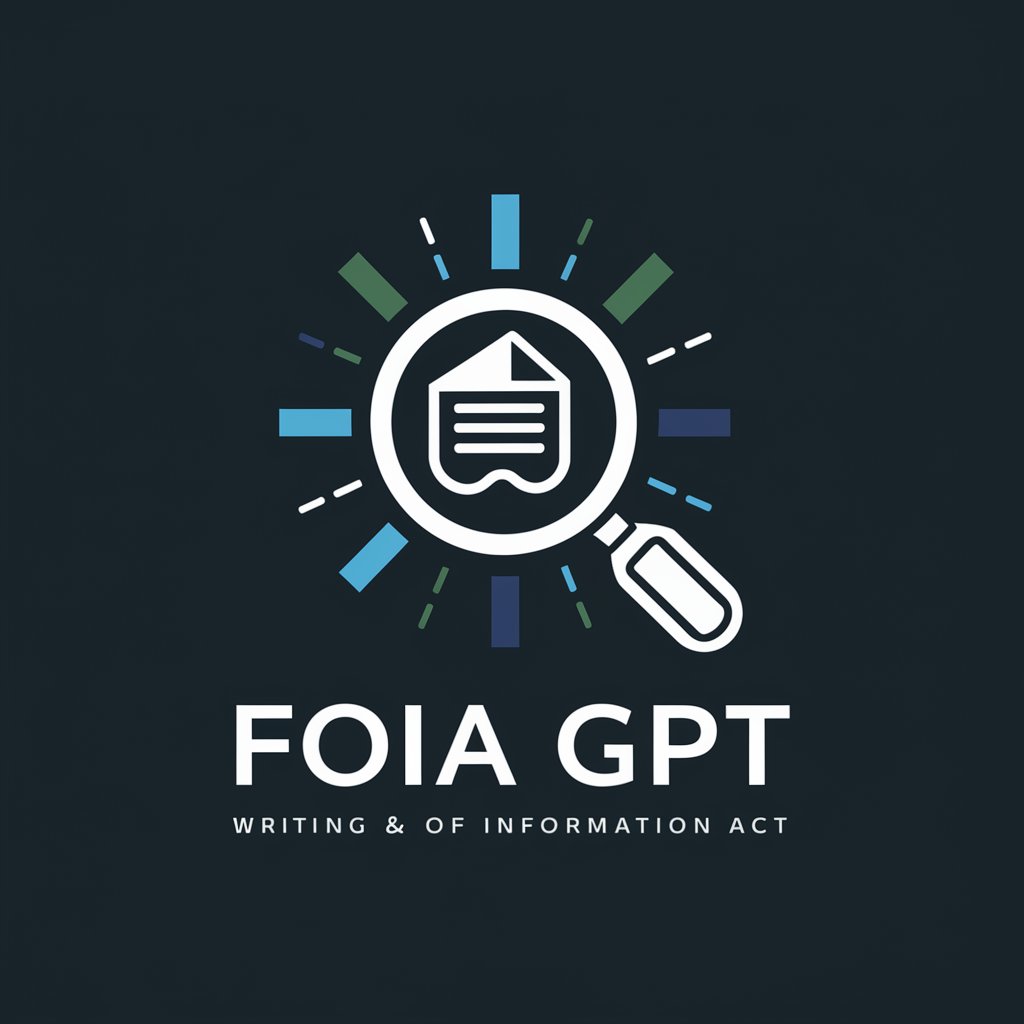
FOIA GPT - AI-Powered FOIA Expertise

Welcome! I'm here to assist with your FOIA requests.
Empowering Transparency with AI
How to craft an effective FOIA request...
Best practices for appealing a denied FOIA request...
Strategies to enhance transparency in government through FOIA...
Understanding the Freedom of Information Act: A guide...
Get Embed Code
Overview of FOIA GPT
FOIA GPT is a specialized AI tool designed to assist with the Freedom of Information Act (FOIA) requests in the United States. It is tailored to guide users through the complex process of drafting, submitting, and managing FOIA requests. The purpose of FOIA GPT is to democratize access to government-held information by simplifying the FOIA request process. This tool is particularly useful in identifying the most relevant government agencies for specific information requests, crafting legally sound and effective FOIA request letters, and advising on strategies for appeals and follow-ups if a request is denied or inadequately responded to. FOIA GPT can also interpret responses from government agencies, offering insights and further actions. An example scenario is assisting a journalist in requesting detailed expenditure reports from a specific federal agency, ensuring the request is clear, concise, and legally compliant. Powered by ChatGPT-4o。

Key Functions of FOIA GPT
Drafting FOIA Requests
Example
Creating a request letter for environmental data from the EPA.
Scenario
A researcher needs historical pollution data. FOIA GPT assists in drafting a request that clearly articulates the need for specific data, ensuring compliance with legal requirements.
Identifying Relevant Agencies
Example
Determining the appropriate federal agency for military spending records.
Scenario
A citizen wants information on defense budgets. FOIA GPT identifies the Department of Defense as the relevant agency and guides in directing the request appropriately.
Interpreting Government Responses
Example
Analyzing a response received regarding a request for public health records.
Scenario
A journalist receives complex documents from the CDC. FOIA GPT helps interpret the data, suggesting if further clarification or an appeal is necessary.
Advising on Appeals and Follow-Ups
Example
Guiding on how to appeal a denied request for government email correspondences.
Scenario
An activist's request is denied citing security concerns. FOIA GPT advises on how to construct an appeal, focusing on narrowing the scope or challenging the exemption.
Target User Groups for FOIA GPT
Journalists and Media Professionals
Journalists often require access to government-held information for investigative reporting. FOIA GPT can assist them in crafting precise requests and navigating complex government structures.
Researchers and Academics
Academics seeking historical or current government data for research purposes can utilize FOIA GPT to access the necessary information efficiently and effectively.
Legal Professionals
Lawyers and legal advocates may use FOIA GPT to obtain information pertinent to legal cases or policy research, ensuring requests are legally robust.
Activists and Civil Society Groups
Activists seeking transparency and accountability from government agencies can rely on FOIA GPT for guidance in requesting and interpreting information.
General Public
Individuals with a need or interest in accessing government records, such as for community issues or personal concerns, can find FOIA GPT a valuable resource in navigating the FOIA process.

Guidelines for Using FOIA GPT
Start Your Journey
Visit yeschat.ai for a free trial without login, also no need for ChatGPT Plus. This initial step provides easy access to FOIA GPT.
Identify Your FOIA Request
Clearly define the information you seek from a U.S. government agency. Be specific about documents, dates, and subjects to ensure a precise FOIA request.
Utilize FOIA GPT Expertise
Engage with FOIA GPT by inputting your request details. Take advantage of its expertise in drafting FOIA requests, understanding legal jargon, and strategizing responses.
Review and Customize Requests
Carefully review the generated FOIA request. Customize it if necessary to ensure it aligns with your specific needs and legal requirements.
Submit and Follow Up
Submit the request to the appropriate government agency. Use FOIA GPT for any follow-up actions, including interpreting responses and strategizing appeals if necessary.
Try other advanced and practical GPTs
Web Hacking Wizard
Empowering Ethical Hacking with AI

Market Analyst
Enhance Your Trades with AI Analysis

NattafortellingGPT (3-7 år) med bilder 🪄
Magical Tales for Young Minds, Powered by AI

Code Animator
Bringing Code to Life with AI

The ATOM library tutor
AI-powered Molecular Simulation Guidance

Politik GPT
AI-Powered Political Strategy at Your Fingertips

Wittmen
Empowering Decisions with AI-Driven Insights

Weather GPT
Forecasting with Attitude: AI-Powered, Snark-Infused

AYA: Ask You Anything
Ignite Curiosity with AI

IAC Code Guardian
AI-Powered IaC Security at Your Fingertips

Buildspace
Empowering Startup Journeys with AI Insights

Character Crafter
Craft Diverse, Dynamic Characters with AI

FAQs About FOIA GPT
What is FOIA GPT's primary function?
FOIA GPT specializes in assisting users with drafting and strategizing Freedom of Information Act requests in the United States. It helps in creating effective requests and interpreting government responses.
Can FOIA GPT help in case of a denied FOIA request?
Yes, FOIA GPT can analyze the denial, suggest reasons for the rejection, and assist in crafting an appeal, considering legal angles and potential areas for rephrasing the request.
Does FOIA GPT have access to government databases?
No, FOIA GPT does not access government databases directly. It aids users in requesting information from such databases through official FOIA requests.
Can FOIA GPT guarantee successful FOIA requests?
While FOIA GPT increases the likelihood of a successful request by ensuring clarity and legal soundness, it cannot guarantee success as responses depend on government agencies' discretion and information availability.
How user-friendly is FOIA GPT for beginners?
FOIA GPT is designed with user-friendliness in mind, offering guidance at each step of the FOIA request process. Beginners can easily navigate its interface and understand the complexities of FOIA requests.





